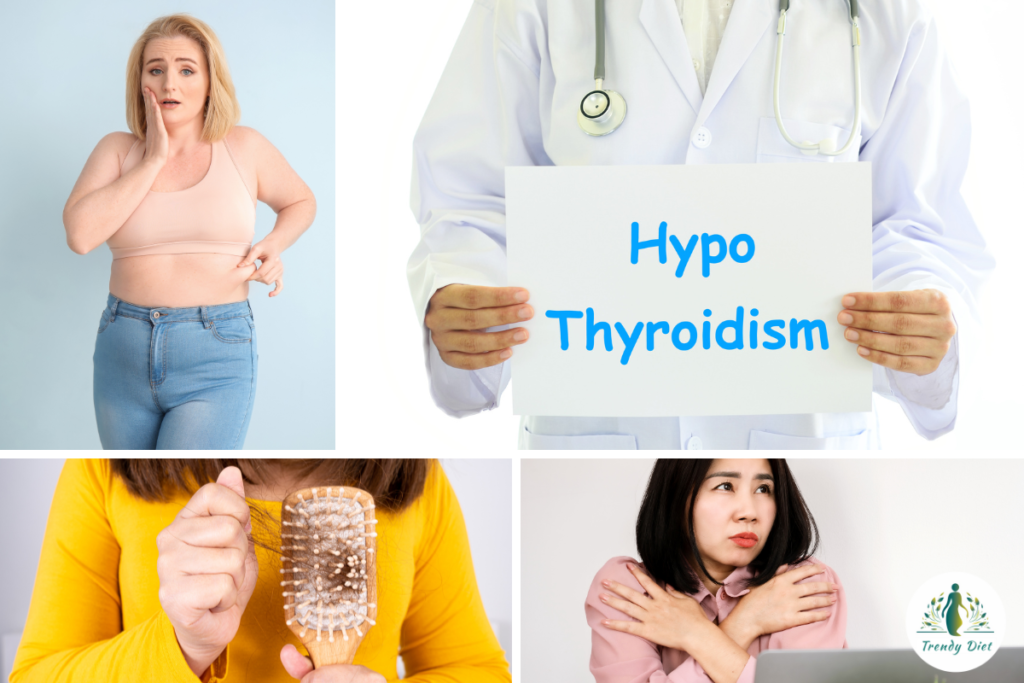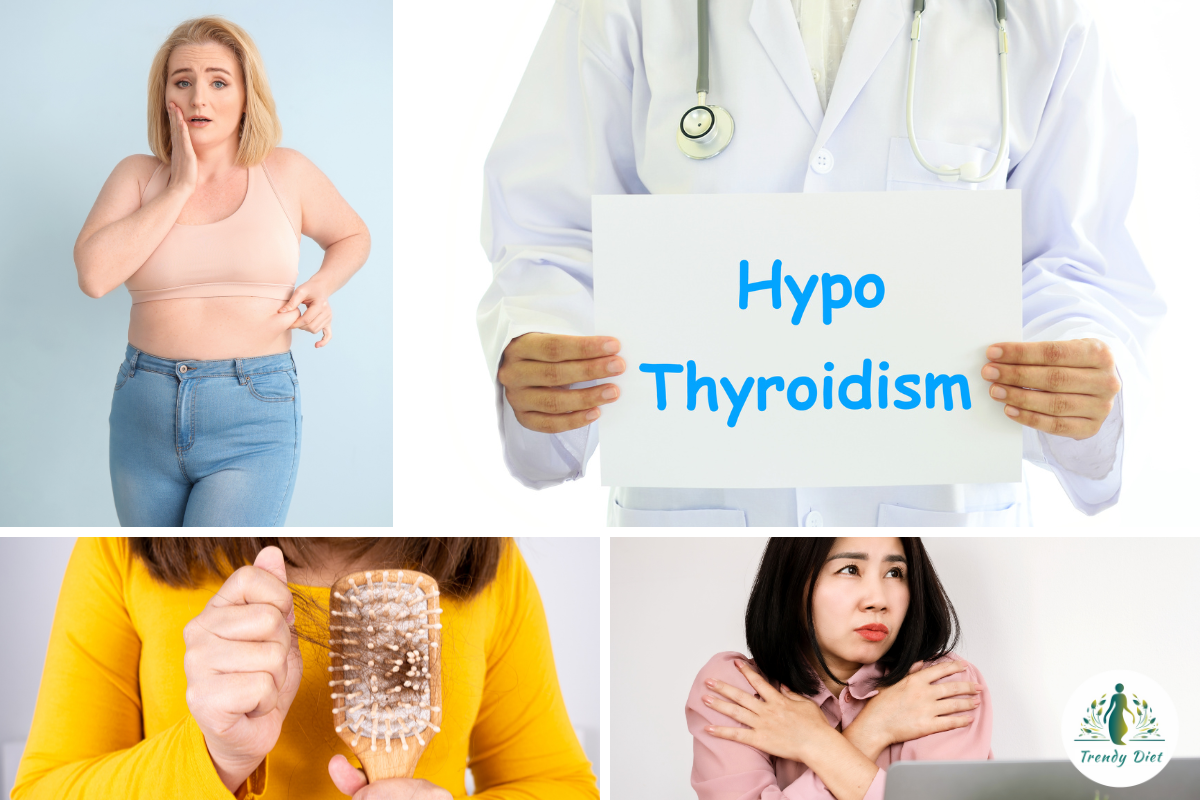
What to Eat and Avoid for Hypothyroidism – Thyroid Diet Chart
Introduction
Your health may be significantly impacted by hypothyroidism, a disorder caused by an underactive thyroid gland. While medicine is an essential part of treatment, your thyroid function can be dramatically impacted by your food choices. In this article, we’ll discuss which foods to eat and which to stay away from in order to maintain a healthy thyroid.
Knowing about hypothyroidism
A crucial component of the endocrine system, the thyroid gland releases hormones that control a number of body functions. This gland fails to generate enough hormones in hypothyroidism, which causes a number of symptoms. A healthy thyroid can be improved with a well-balanced diet in addition to medicine as the main form of treatment.
Here are some common symptoms of hypothyroidism:
Fatigue and Weakness: Feeling tired and lacking energy, even after a good night’s sleep.
Weight Gain: Unexplained weight gain or difficulty losing weight.
Cold Sensitivity: Feeling unusually sensitive to cold temperatures.
Dry Skin and Hair: Skin may become dry and hair may become brittle.
Muscle Aches and Joint Pain: Generalized pain and stiffness, often in the muscles and joints.
Constipation: Difficulty passing stools.
Depression or Mood Changes: Feeling down or experiencing changes in mood.
Slowed Heart Rate: Heart rate may be slower than usual.
Menstrual Irregularities: Changes in menstrual cycle, including heavier or more painful periods.
Memory Problems: Difficulty with concentration and memory.
Swelling: Especially in the face, hands, and feet.
Hoarseness: Changes in voice tone or hoarseness.
Elevated Cholesterol Levels: High levels of cholesterol in the blood.
Thinning Hair: Hair may become thin, especially at the outer edges.
Brittle Nails: Nails may become weak and brittle.
Dietary Guidelines for Hypothyroidism
A nutritious diet is important for everyone, but people with hypothyroidism should pay particular attention to it. Changing your diet to promote thyroid function can help you feel better overall and reduce symptoms.
A sample Thyroid diet chart-
Including These Foods in Your Diet
Include a variety of non-starchy veggies such as artichokes, zucchini, and greens. These are nutrient-dense while not interfering with thyroid function.
2. Nutrient-Rich Fruits
Fruits high in vitamins and antioxidants, such as berries, apples, citrus fruits, and other nutrient-rich fruits, are good for thyroid health.
3. Lean Protein Sources
Choose lean sources of protein, such as fish, chicken, and eggs. These offer the essential amino acids needed for a number of biological processes.
4. Healthy Fats
Include sources of healthy fats like nuts, avocados, and olive oil in your diet. These fats aid in the generation of hormones and general wellness.
5. Gluten-Free Grains
Brown rice, quinoa, and gluten-free oats are great substitutes for grains made from wheat, especially for people who have Hashimoto’s thyroiditis.
6. Selenium-Rich Foods
Include foods high in selenium, such as eggs, tuna, and Brazil nuts. Selenium is essential for preventing oxidative stress on the thyroid.
7. Beans and Lentils
- Foods to Handle Carefully
Ultra-Processed Foods and Gluten:
Some sufferers of Hashimoto’s thyroiditis find relief from their symptoms on a gluten-free diet. Limiting meals that are highly processed can also help to reduce inflammation and improve general health.
Foods that can cause goiter:
Cruciferous vegetables like broccoli and cabbage contain chemicals that may prevent the formation of thyroid hormones. While modest use is normally safe, it would be wise to steer clear of high doses.
Thyroid Diet Chart and Medication
The best thyroid medication absorption is essential for successful therapy. Take your prescription on an empty stomach and stay away from anything that can prevent proper absorption. Particularly coffee can affect how well pills are absorbed.
Essential Vitamins for Hypothyroidism
People with hypothyroidism should be aware of the following vitamins and minerals as they are included in thyroid diet chart
- Vitamin D
- Vitamin B12
- Magnesium
- Iron
Vitamin D: People who have hypothyroidism frequently lack vitamin D. Low levels might aggravate the symptoms of hypothyroidism and have an adverse effect on thyroid function. Supplementation is frequently required because vitamin D isn’t found in large quantities in many foods.
Vitamin B12: People with hypothyroidism frequently lack this vitamin. B12 levels should be checked. A doctor may suggest a B12 or B-complex vitamin if levels are low.
Low magnesium levels are linked to thyroid issues and can raise the possibility of developing hypothyroidism. It has been demonstrated that taking magnesium supplements helps with hypothyroid symptoms.
Iron: Women with hypothyroidism frequently have iron deficiencies. Thyroid function might be hampered by iron deficiency anemia or low iron levels. Taking supplements might help you reach and keep up healthy iron levels.
These are only a few of the several nutrients that are crucial for thyroid health and general wellbeing. Other instances of nutrients that are crucial for those who have hypothyroidism include:
- Folate
- Vitamin A
- Calcium
- Protein
Making Your Own Customized Diet Plan
Those who have hypothyroidism could have different dietary requirements. A balanced eating plan can be created with particular foods to cut out by working with a trained dietitian. You and your partner can design a diet that meets your specific health needs.
Conclusion
It’s proactive to manage hypothyroidism by including thyroid diet chart. While there is no one solution that works for everyone, making wise food decisions can greatly improve your wellbeing. Always keep in mind that a balanced diet enhances medical care and results in a healthier, happier you
